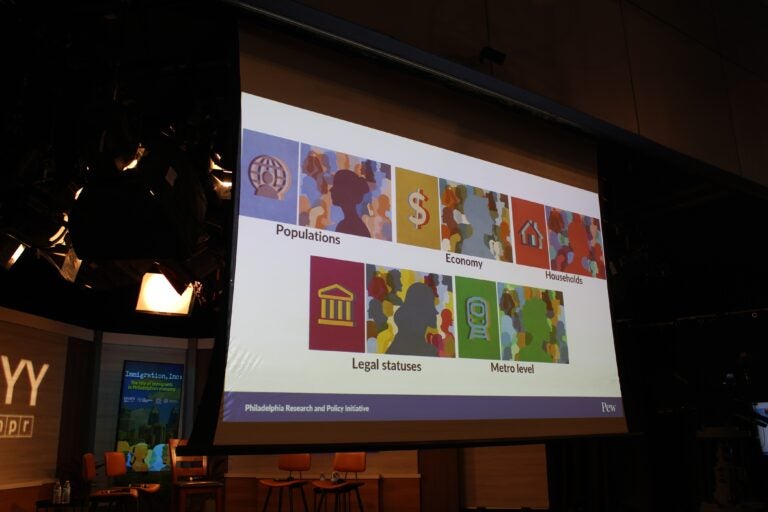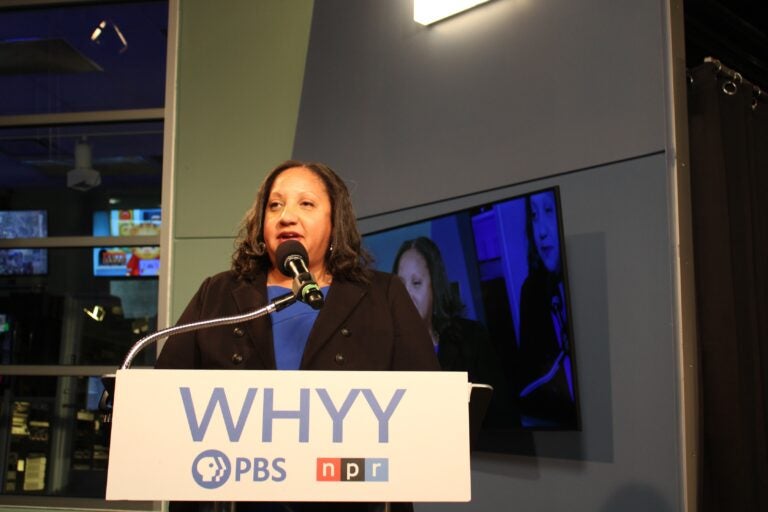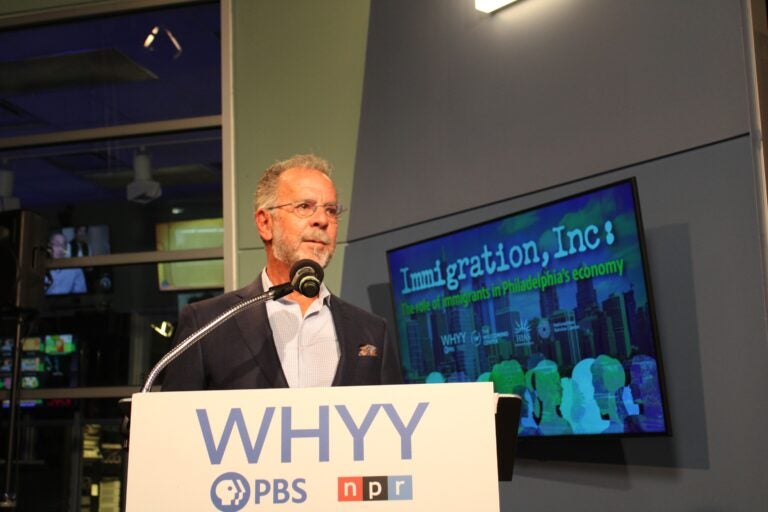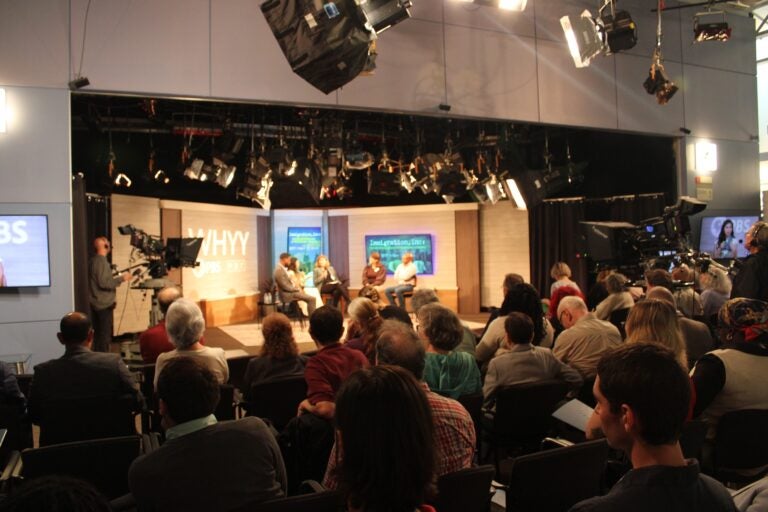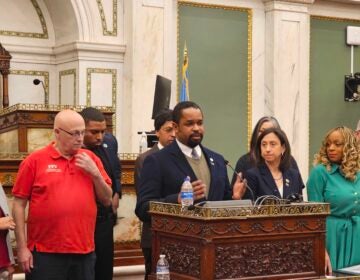5 things to know about immigrants in Philadelphia’s economy
Speakers and panelists discussed the long-term economic benefits of immigrants at a WHYY event on Wednesday.
Listen 1:07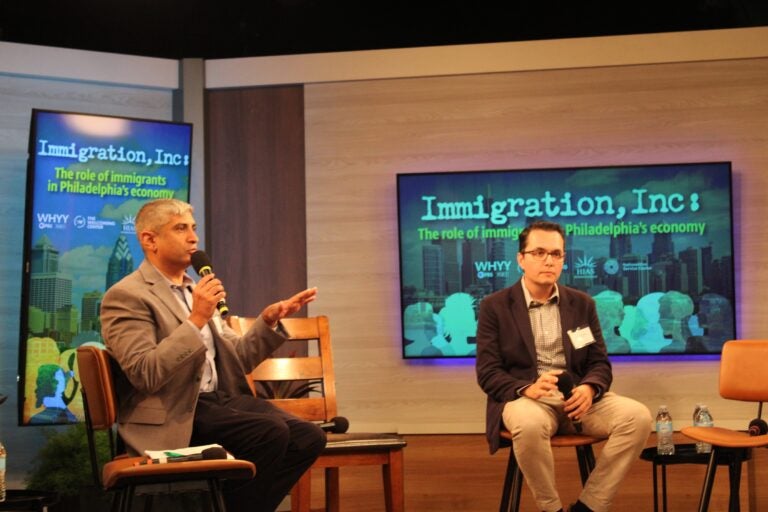
Anuj Gupta, left, CEO of The Welcoming Center, speaks with Zeke Hernandez, right, a professor at University of Pennsylvania's Wharton School of Business and author of "The Truth About Immigration." (Emily Neil/WHYY)
From Philly and the Pa. suburbs to South Jersey and Delaware, what would you like WHYY News to cover? Let us know!
Experts from academia, industry and advocacy groups explored the impact of immigrant workers and entrepreneurs on Philadelphia’s economy at a WHYY event on Wednesday.
Maridarlyn Gonzalez, senior research associate at The Pew Charitable Trusts, presented Pew’s recent reports on immigrants in the city’s labor force. Anuj Gupta, CEO of The Welcoming Center, spoke with Zeke Hernandez, author of “The Truth About Immigration,” and WHYY’s Maiken Scott interviewed a panel of immigrant business owners and experts on entrepreneurship.

Here are five key takeaways about immigrants’ role in the city’s economy.
1. Immigrants create a bigger and more diversified economy
Zeke Hernandez, a professor at the University of Pennsylvania’s Wharton School of Business and author of “The Truth About Immigration,” said the notion that immigrants take jobs from native-born residents is false.
“When you get an influx of new people, you don’t just get a whole bunch of new workers,” he said. “The whole economic pie grows.”
Hernandez said research shows immigrants provide five essential inputs into an economy: investment, innovation, talent, taxes and new jobs.
“That’s the wishlist of anybody who wants a thriving community,” he said, noting the economic growth that comes from those inputs from immigrants is “why you don’t get zero-sum competition, because you now have to power a bigger economy.”
Immigrants also help diversify the economy by bringing different kinds of businesses, ideas, investment sources and more, he said.
“When you get a bigger economy and a more diversified economy, you need a whole set of new people to fill that higher number and that higher variety of jobs and positions, and so you get win-win instead of zero-sum,” Hernandez said.
2. Immigrants have fueled Philadelphia’s labor force growth
Pew’s Maridarlyn Gonzalez highlighted findings of the organization’s recent research on Philadelphia’s immigrant communities.
“Immigrants fill jobs, create businesses, fuel entire industries beyond the rates of their share in the Philadelphia population,” Gonzalez said.
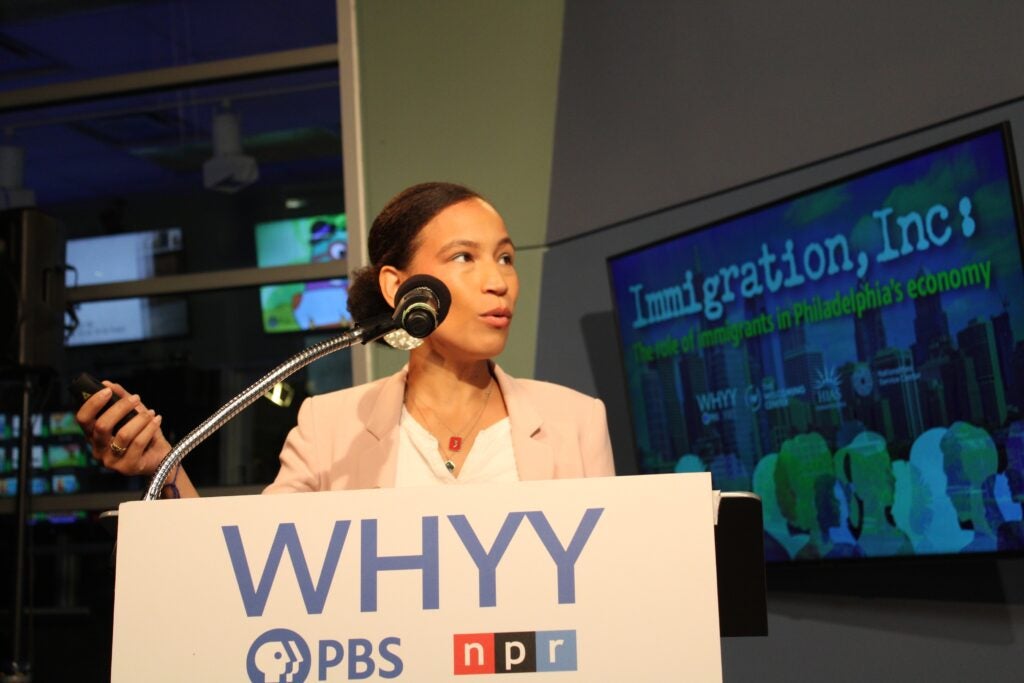
According to Pew’s findings, immigrants account for 30% of the expansion of Philadelphia’s workforce since 2010. As of 2022, one in five working residents in Philadelphia is an immigrant.
3. Immigrant entrepreneurs face unique challenges — but make up more than a third of all Philly business owners
Gonzalez said according to Pew’s research, immigrants account for more than a third of all business owners in Philadelphia.
In the panel discussion, immigrant entrepreneurs Silvia Roldan, Veenu Aishwarya and Mariagenli Alicea Saez discussed their experiences starting and running their own business, and the challenges they faced in the process.
Alicea Saez, owner of Cantina La Martina, moved to Philadelphia from Puerto Rico. She said navigating compliance and other regulations was a challenge, and there weren’t a lot of resources for Latina/o entrepreneurs.
She said finding supportive community was also a challenge.
“I was made to feel different,” she said.
But Alicea Saez said her experience as a Puerto Rican, having lived through hurricanes on the island and then facing the many challenges of moving to Philadelphia, has helped her cultivate “resilience” as an entrepreneur.
Veenu Aishwarya, co-founder and CEO of AUM LifeTech, said immigration status and other factors that impact resources and ability to start a business can also pose hurdles for recent arrivals in the country.
“For example, if you work on a work visa, you just can’t start a company because you need to get your paperwork in place, and you have to get your green card and all those things,” Aishwarya, an immigrant from India, said. “When I came on my certain visa to work in Philly, I had to pass through all those, because I wanted to start a company but I had to navigate through those immigration hurdles.”
Roldan, founder of Yaku Wear and a member of the Global Craft Market, cited language access as the first barrier. She is from Ecuador and started her entrepreneurship process by learning English. From there, she sought out other support.
“I started looking for programs about how to write in my business plan, so that’s how I started preparing myself to have my small business,” she said.
Thomas Young, CEO of the World Trade Center Greater Philadelphia, a nonprofit that helps accelerate global business growth in the region, said it’s important for all business stakeholders to work together to support immigrant entrepreneurship.
“The number one challenge that I hear about is access to capital,” Young said. “A lot of our entrepreneurs do not have the credit history it takes to get loans.”
He said language and cultural barriers are also challenges for immigrant entrepreneurs, as well as the complexity of the regulatory system in the U.S.
Young noted that life sciences and technology, in addition to hospitality, restaurants and other industries, have seen the impact of immigrant entrepreneurs in the Philadelphia area and beyond.
4. Cities see benefits when second-generation immigrants stay
Hernandez said in the long run, “Immigrants are net positive fiscal contributors.”
“They pay more in taxes than they consume in public services,” he said.
There are short-term costs to accommodate and support newly arrived immigrants, Hernandez said, especially if cities or towns receive an unexpected, larger group of immigrants. Public resources are spent on housing, other forms of social services support and education for the children of immigrants.
But those short-term costs are quickly outpaced by contributions of subsequent generations.
“They more than double whatever it cost the city or the state in terms of the taxes that they pay,” Hernandez said. “So if you think of a return on investment, welcoming immigrants is a smart fiscal investment. But you do have to balance the budget in the short term.”
Hernandez said U.S. history shows that restricting immigration can be damaging to the whole country’s economy.
5. Legislators should examine the economic impacts of immigrants when creating immigration policy
Gupta, of The Welcoming Center, addressed both presidential candidates’ plans for immigration. Former President Donald Trump is calling for mass deportation while Vice President Kamala Harris’ plan highlights enhanced restrictions on immigration.
Hernandez said conversations on immigration policy usually revolve around one of two emotions — “unfounded fear” or pity — neither of which take into account economic impacts at the local and national level.
“Nobody is actually making a case that is self-interested in terms of what’s good for us,” he said. “And when you look at the data and the evidence, immigrants don’t need your fear, and they certainly don’t need your pity. Immigrants need to be welcomed because it’s good for us.”
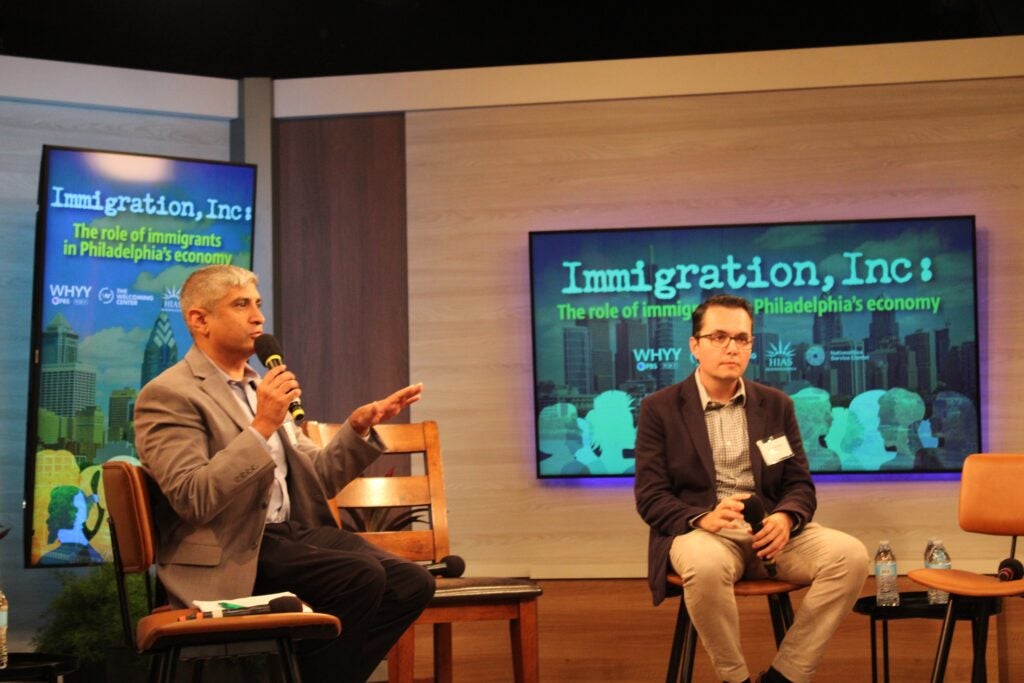
Hernandez again referenced the five contributions of immigrants to the economy, and noted that all immigrants, regardless of their legal status, are paying taxes.
“There is a winning, popular, center, very acceptable case for immigration politically that is about the prosperity that immigrants can create for us and create a better future for our children, and I’m frustrated that we don’t see that,” he said.

Get daily updates from WHYY News!
WHYY is your source for fact-based, in-depth journalism and information. As a nonprofit organization, we rely on financial support from readers like you. Please give today.





